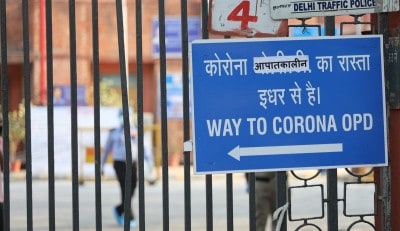By Aakanksha Khajuria
New Delhi, Nov 7 : Lok Nayak Jai Prakash Narayan (LNJP) Hospital, India’s largest Covid-19 hospital run by the Delhi government, appears to be crumbling under the weight of soaring coronavirus cases, with only 6 per cent ventilator beds vacant in the hospital.
According to Delhi government’s Corona application, only 19 per cent of the ICU beds with ventilators are vacant across the city, 22 per cent of ICU beds without ventilators are unoccupied, while only 50 per cent of normal Covid-19 beds are available. The patients are running from pillar to post just to occupy a single bed.
LNJP currently has only five vacant ventilator beds, 22 ICU beds without ventilators and 1,398 Covid-19 beds.
Speaking to IANS, LNJP Medical Director Suresh Kumar said, “If we run out of beds, we have central allocation. For example, if the beds are full, patients can be sent to Rajiv Gandhi, GTB or other hospitals.”
The Medical Director further emphasised, “We are admitting majority of the patients, but a few stable patients, who require mere observation, are being referred to other hospitals.”
The Rajiv Gandhi Super Specialty Hospital confirmed that it has been receiving patients from LNJP due to shortage of beds.
Delhi has been witnessing a massive spike in daily Covid-19 cases for the last one week. It had witnessed its highest single-day spike on Friday, when it reported 7,178 cases.
Earlier this week, the increase in the number of cases had prompted Chief Minister Arvind Kejriwal to admit that a ‘third wave’ of infection has hit the national capital.
Kumar said that admissions to city hospital have doubled in the last one week.
“The hospital used to admit over 50 Covid-19 patients everyday, but in the last one week, the admissions have gone up to at least 100 a day, but only serious patients or those with moderate disease are being admitted,” Kumar said.
He added, “Over the last one week, we are getting more and more elderly people because of the pollution. At one side, you have low oxygen in the air and then the Covid-19. These factors cause double harm to the lungs and people have low oxygen saturation.”
“Before this, people from all age groups used to come, but now only those above 60 years of age are coming. Such patients are more critically sick and require more ventilator beds, oxygen support as they have more complications,” Kumar said.
He attributed the spike in Covid-19 cases to drop in temperature, which favours the viral replication, over-crowding in markets and flouting of Covid-appropriate behaviour.
“Most of the markets and malls are overcrowded. Controlling this would require a lot of enforcement,” Kumar said.
According to Resident Doctors’ Association President Keshave Singh, more than 100 doctors of the hospital have been infected till now, out of which two have succumbed to the disease.
The Medical Director of Delhi government-run Rajiv Gandhi Super Specialty Hospital, B.L. Sherwal, also told IANS about the significant spike in the number of admissions in comparison to the last month.
“Laxity in following anti-Covid norms in the festive season has resulted in a massive spike in daily numbers. Lack of social responsibility in following social distancing norms, not adhering to wearing masks, high pollution levels and change in season are the reasons for the increase in cases,” he said.
Not only the Delhi government hospitals, but the Central government-run hospitals are also facing the wrath of the third wave.
Rana A.K. Singh, Medical Superintendent of Central government-run Dr Ram Manohar Lohia Hospital, said the institute is reeling under intense work load due to increase in admissions.
“The number of both Covid-19 and non Covid-19 patients in the hospital have started increasing. We are also pressured as far as ICU beds are concerned. As soon as they get vacant, they get filled up again. The pressure is, however, less as compared to the second wave,” Singh said.
He added, “ICU beds are currently full, and no bed is empty right now. If a patient with serious condition comes, he/she will have to explore the possibility of finding bed in another hospital.”
(Aakanksha Khajuria can be contacted at aakanksha.k@ians.in)
Disclaimer: This story is auto-generated from IANS service.

